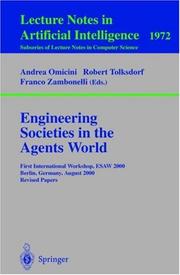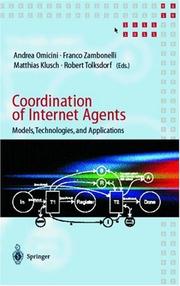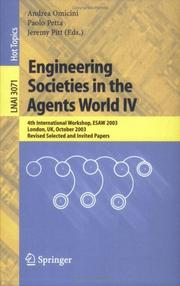| Listing 1 - 10 of 38 | << page >> |
Sort by
|
Book
ISBN: 3039430467 3039430475 Year: 2020 Publisher: MDPI - Multidisciplinary Digital Publishing Institute
Abstract | Keywords | Export | Availability | Bookmark
 Loading...
Loading...Choose an application
- Reference Manager
- EndNote
- RefWorks (Direct export to RefWorks)
Book
Year: 2020 Publisher: Basel, Switzerland MDPI - Multidisciplinary Digital Publishing Institute
Abstract | Keywords | Export | Availability | Bookmark
 Loading...
Loading...Choose an application
- Reference Manager
- EndNote
- RefWorks (Direct export to RefWorks)
Research on intelligent agents and multi-agent systems has matured during the past decade, and many effective applications of this technology are currently being deployed. Although computational approaches for multi-agent systems have mainly emerged in the past few decades, scholars have been prolific with regard to the variety of methods proposed to solve this paradigm. Different communities have emerged with multi-agent systems as their main research topic. Multi-agent systems allow the development of distributed and intelligent applications in complex and dynamic environments. Systems of this kind play a crucial role in life, evidenced by the broad range of applied areas involved in their use, including manufacturing, management sciences, e-commerce, and biotechnology. There are many reasons for the interest of researchers in this new discipline. Firstly, computational systems have gradually shifted towards a distributed paradigm where heterogeneous entities with different goals can enter and leave the system dynamically and interact with each other. Secondly, new computational systems should be able to negotiate with one another, typically on the behalf of humans, in order to come to mutually acceptable agreements. As a consequence, autonomy, interaction, mobility, and openness are key concepts studied in the area. The purpose of this book is to document some of the advances made in this paradigm and attempt to show the current state of this technology by analyzing different aspects in addition its possible application in various domains. This review of the current state-of-the-art does not intend to make an exhaustive exploration of all the current existing works but, rather, to try to give an overview of the research in agent technology, showing the high level of activity of this area.
History of engineering & technology --- multi-robot --- consensus problem --- formation control --- noise --- time delay --- unmanned surface vehicles --- multi-agent system --- training system --- genetic-based fuzzy rule learning --- intelligent autonomous control --- modeling and simulation --- multi-agent systems --- smart city development --- spatiotemporal modeling --- actor–network theory --- geoparticipation --- social interactions --- simulation model --- photovoltaic energy --- parameter fine-tuning --- self-reported behaviour --- predictive model --- multi-agent planning and scheduling --- potential game --- equilibrium selection --- interoperability --- multiagent systems --- organizational models --- agent-based collective intelligence --- multi-agent complex systems --- scale-free properties --- power law distribution --- biologically inspired approaches and methods --- collective foraging --- physics-based simulation --- methodologies for agent-based systems --- multi-robot simulation --- discrete event simulator --- agent and multi-agent applications --- classification --- prediction --- multi-agent --- wisdom-of-crowds --- Hollywood --- feature-extension --- collective-intelligence --- swarm --- educational games --- game design --- situated psychological agents --- education --- competences --- decision support system --- agent based modeling and simulation --- production scheduling --- green coffee supply chain --- agent-based modeling --- agent-based simulation --- decision support
Book
Year: 2020 Publisher: Basel, Switzerland MDPI - Multidisciplinary Digital Publishing Institute
Abstract | Keywords | Export | Availability | Bookmark
 Loading...
Loading...Choose an application
- Reference Manager
- EndNote
- RefWorks (Direct export to RefWorks)
Research on intelligent agents and multi-agent systems has matured during the past decade, and many effective applications of this technology are currently being deployed. Although computational approaches for multi-agent systems have mainly emerged in the past few decades, scholars have been prolific with regard to the variety of methods proposed to solve this paradigm. Different communities have emerged with multi-agent systems as their main research topic. Multi-agent systems allow the development of distributed and intelligent applications in complex and dynamic environments. Systems of this kind play a crucial role in life, evidenced by the broad range of applied areas involved in their use, including manufacturing, management sciences, e-commerce, and biotechnology. There are many reasons for the interest of researchers in this new discipline. Firstly, computational systems have gradually shifted towards a distributed paradigm where heterogeneous entities with different goals can enter and leave the system dynamically and interact with each other. Secondly, new computational systems should be able to negotiate with one another, typically on the behalf of humans, in order to come to mutually acceptable agreements. As a consequence, autonomy, interaction, mobility, and openness are key concepts studied in the area. The purpose of this book is to document some of the advances made in this paradigm and attempt to show the current state of this technology by analyzing different aspects in addition its possible application in various domains. This review of the current state-of-the-art does not intend to make an exhaustive exploration of all the current existing works but, rather, to try to give an overview of the research in agent technology, showing the high level of activity of this area.
History of engineering & technology --- multi-robot --- consensus problem --- formation control --- noise --- time delay --- unmanned surface vehicles --- multi-agent system --- training system --- genetic-based fuzzy rule learning --- intelligent autonomous control --- modeling and simulation --- multi-agent systems --- smart city development --- spatiotemporal modeling --- actor–network theory --- geoparticipation --- social interactions --- simulation model --- photovoltaic energy --- parameter fine-tuning --- self-reported behaviour --- predictive model --- multi-agent planning and scheduling --- potential game --- equilibrium selection --- interoperability --- multiagent systems --- organizational models --- agent-based collective intelligence --- multi-agent complex systems --- scale-free properties --- power law distribution --- biologically inspired approaches and methods --- collective foraging --- physics-based simulation --- methodologies for agent-based systems --- multi-robot simulation --- discrete event simulator --- agent and multi-agent applications --- classification --- prediction --- multi-agent --- wisdom-of-crowds --- Hollywood --- feature-extension --- collective-intelligence --- swarm --- educational games --- game design --- situated psychological agents --- education --- competences --- decision support system --- agent based modeling and simulation --- production scheduling --- green coffee supply chain --- agent-based modeling --- agent-based simulation --- decision support
Book
Year: 2020 Publisher: Basel, Switzerland MDPI - Multidisciplinary Digital Publishing Institute
Abstract | Keywords | Export | Availability | Bookmark
 Loading...
Loading...Choose an application
- Reference Manager
- EndNote
- RefWorks (Direct export to RefWorks)
Research on intelligent agents and multi-agent systems has matured during the past decade, and many effective applications of this technology are currently being deployed. Although computational approaches for multi-agent systems have mainly emerged in the past few decades, scholars have been prolific with regard to the variety of methods proposed to solve this paradigm. Different communities have emerged with multi-agent systems as their main research topic. Multi-agent systems allow the development of distributed and intelligent applications in complex and dynamic environments. Systems of this kind play a crucial role in life, evidenced by the broad range of applied areas involved in their use, including manufacturing, management sciences, e-commerce, and biotechnology. There are many reasons for the interest of researchers in this new discipline. Firstly, computational systems have gradually shifted towards a distributed paradigm where heterogeneous entities with different goals can enter and leave the system dynamically and interact with each other. Secondly, new computational systems should be able to negotiate with one another, typically on the behalf of humans, in order to come to mutually acceptable agreements. As a consequence, autonomy, interaction, mobility, and openness are key concepts studied in the area. The purpose of this book is to document some of the advances made in this paradigm and attempt to show the current state of this technology by analyzing different aspects in addition its possible application in various domains. This review of the current state-of-the-art does not intend to make an exhaustive exploration of all the current existing works but, rather, to try to give an overview of the research in agent technology, showing the high level of activity of this area.
multi-robot --- consensus problem --- formation control --- noise --- time delay --- unmanned surface vehicles --- multi-agent system --- training system --- genetic-based fuzzy rule learning --- intelligent autonomous control --- modeling and simulation --- multi-agent systems --- smart city development --- spatiotemporal modeling --- actor–network theory --- geoparticipation --- social interactions --- simulation model --- photovoltaic energy --- parameter fine-tuning --- self-reported behaviour --- predictive model --- multi-agent planning and scheduling --- potential game --- equilibrium selection --- interoperability --- multiagent systems --- organizational models --- agent-based collective intelligence --- multi-agent complex systems --- scale-free properties --- power law distribution --- biologically inspired approaches and methods --- collective foraging --- physics-based simulation --- methodologies for agent-based systems --- multi-robot simulation --- discrete event simulator --- agent and multi-agent applications --- classification --- prediction --- multi-agent --- wisdom-of-crowds --- Hollywood --- feature-extension --- collective-intelligence --- swarm --- educational games --- game design --- situated psychological agents --- education --- competences --- decision support system --- agent based modeling and simulation --- production scheduling --- green coffee supply chain --- agent-based modeling --- agent-based simulation --- decision support

ISBN: 3540445390 3540414770 Year: 2000 Publisher: New York, NY ; Berlin : Springer-Verlag,
Abstract | Keywords | Export | Availability | Bookmark
 Loading...
Loading...Choose an application
- Reference Manager
- EndNote
- RefWorks (Direct export to RefWorks)
This book constitutes the thoroughly refereed post-proceedings of the First International Workshop on Engineering Societies in the Agents World, ESAW 2000, held in Berlin, Germany in August 2000. The 10 revised full papers presented were carefully reviewed and selected for inclusion in the book; they are organized in topical sections on emerging issues in multi-agent systems engineering, coordination models and technologies for multi-agent systems, and methodologies and tools.
Intelligent agents (Computer software) --- Engineering --- Computer Science --- Engineering & Applied Sciences --- Societies, etc --- Societies, etc. --- Construction --- Computer science. --- Computer communication systems. --- Software engineering. --- User interfaces (Computer systems). --- Artificial intelligence. --- Computer Science. --- Artificial Intelligence (incl. Robotics). --- Software Engineering. --- Computer Communication Networks. --- Information Systems Applications (incl. Internet). --- User Interfaces and Human Computer Interaction. --- AI (Artificial intelligence) --- Artificial thinking --- Electronic brains --- Intellectronics --- Intelligence, Artificial --- Intelligent machines --- Machine intelligence --- Thinking, Artificial --- Bionics --- Cognitive science --- Digital computer simulation --- Electronic data processing --- Logic machines --- Machine theory --- Self-organizing systems --- Simulation methods --- Fifth generation computers --- Neural computers --- Interfaces, User (Computer systems) --- Human-machine systems --- Human-computer interaction --- Computer software engineering --- Communication systems, Computer --- Computer communication systems --- Data networks, Computer --- ECNs (Electronic communication networks) --- Electronic communication networks --- Networks, Computer --- Teleprocessing networks --- Data transmission systems --- Digital communications --- Electronic systems --- Information networks --- Telecommunication --- Cyberinfrastructure --- Network computers --- Informatics --- Science --- Distributed processing --- Industrial arts --- Technology --- Artificial Intelligence. --- Application software. --- Application computer programs --- Application computer software --- Applications software --- Apps (Computer software) --- Computer software

ISBN: 3540416137 9783540416135 Year: 2001 Publisher: Berlin New York Springer
Abstract | Keywords | Export | Availability | Bookmark
 Loading...
Loading...Choose an application
- Reference Manager
- EndNote
- RefWorks (Direct export to RefWorks)
Internet --- Intelligent agents (Computer software) --- DARPA Internet --- Internet (Computer network) --- Wide area networks (Computer networks) --- World Wide Web --- Agents, Autonomous (Computer software) --- Agents, Cognitive (Computer software) --- Agents, Intelligent (Computer software) --- Assistants, Cognitive (Computer software) --- Assistants, Intelligent software --- Autonomous agents (Computer software) --- Cognitive agents (Computer software) --- Cognitive assistants (Computer software) --- IAs (Computer software) --- Intelligent agent software --- Intelligent software agents --- Intelligent software assistants --- Software agents (Computer software) --- Special agents (Computer software) --- Artificial intelligence --- Computer programs
Digital
ISBN: 9783540318873 Year: 2005 Publisher: Berlin Heidelberg Springer-Verlag GmbH
Abstract | Keywords | Export | Availability | Bookmark
 Loading...
Loading...Choose an application
- Reference Manager
- EndNote
- RefWorks (Direct export to RefWorks)
Digital
ISBN: 9783642207150 Year: 2011 Publisher: Berlin, Heidelberg Springer Berlin Heidelberg
Abstract | Keywords | Export | Availability | Bookmark
 Loading...
Loading...Choose an application
- Reference Manager
- EndNote
- RefWorks (Direct export to RefWorks)
Logic --- Computer science --- Programming --- Computer architecture. Operating systems --- Artificial intelligence. Robotics. Simulation. Graphics --- Computer. Automation --- informatica --- ontwerpen --- programmeren (informatica) --- programmeertalen --- software engineering --- KI (kunstmatige intelligentie) --- computernetwerken --- robots

ISBN: 3540259465 3540222316 Year: 2004 Publisher: Berlin, Heidelberg : Springer Berlin Heidelberg : Imprint: Springer,
Abstract | Keywords | Export | Availability | Bookmark
 Loading...
Loading...Choose an application
- Reference Manager
- EndNote
- RefWorks (Direct export to RefWorks)
The fourth internationalworkshop,“EngineeringSocietiesin the Agents World” (ESAW 2003) was a three-dayevent that took place at the end of October 2003. After previous events in Germany, the Czech Republic, and Spain, the workshop crossed the Channel, to be held at the premises of Imperial College, London. The steady increase in the variety of backgrounds of contributing sci- tists, fascinating new perspectives on the topics, and number of participants, bespeaks the success of the ESAW workshop series. Its idea was born in 1999 among members of the working group on “Communication, Coordination, and Collaboration” of the ?rst lease of life of the European Network of Excellence on Agent-Based Computing, AgentLink, out of a critical discussion about the general mindset of the agent community. At that time, we felt that proper c- siderationsofsystemicaspectsofagenttechnologydeployment,suchasackno- edgement of the importance of the social and environmental perspectives, were sorely missing: a de?ciency that we resolved should be addressed directly by a new forum.
Computer science. --- Computer Communication Networks. --- Software engineering. --- Artificial intelligence. --- Computer Science. --- Artificial Intelligence (incl. Robotics). --- Software Engineering. --- Programming Techniques. --- Intelligent agents (Computer software) --- Engineering --- Engineering & Applied Sciences --- Computer Science --- Societies, etc --- Societies, etc. --- Construction --- Computer communication systems. --- Computer programming. --- AI (Artificial intelligence) --- Artificial thinking --- Electronic brains --- Intellectronics --- Intelligence, Artificial --- Intelligent machines --- Machine intelligence --- Thinking, Artificial --- Bionics --- Cognitive science --- Digital computer simulation --- Electronic data processing --- Logic machines --- Machine theory --- Self-organizing systems --- Simulation methods --- Fifth generation computers --- Neural computers --- Computer software engineering --- Computers --- Electronic computer programming --- Electronic digital computers --- Programming (Electronic computers) --- Coding theory --- Communication systems, Computer --- Computer communication systems --- Data networks, Computer --- ECNs (Electronic communication networks) --- Electronic communication networks --- Networks, Computer --- Teleprocessing networks --- Data transmission systems --- Digital communications --- Electronic systems --- Information networks --- Telecommunication --- Cyberinfrastructure --- Network computers --- Informatics --- Science --- Programming --- Distributed processing --- Industrial arts --- Technology --- Artificial Intelligence.

ISBN: 9783540273301 3540273301 3540318879 Year: 2005 Publisher: Berlin, Heidelberg : Springer Berlin Heidelberg : Imprint: Springer,
Abstract | Keywords | Export | Availability | Bookmark
 Loading...
Loading...Choose an application
- Reference Manager
- EndNote
- RefWorks (Direct export to RefWorks)
The ?rst workshop “Engineering Societies in the Agents World” (ESAW) was held in August 2000, in conjunction with the 14th European Conference on Arti?cial Intelligence (ECAI 2000) in Berlin. It was launched by a group of - searchers who thought that the design and development of MASs (multi-agent systems) not only needed adequate theoretical foundations but also a call for new techniques, methodologies and infrastructures to develop MASs as arti?cial societies. The second ESAW was co-located with the European Agent Summer School (ACAI 2001) in Prague, and mostly focused on logics and languages, middleware, infrastructures and applications. In Madrid, the third ESAW c- centrated on models and methodologies and took place with the “Cooperative Information Agents” workshop (CIA 2002). The fourth ESAW in London was the ?rst one that ran as a stand-alone event: apart from the usual works on methodologies and models, it also stressed the issues of applications and m- tidisciplinary models. Based on the success of previous ESAWs, and also given that the di?cult challenges in the construction of arti?cial societies are not yet fully addressed, the ?fth ESAW workshop was organized in the same spirit as its predecessors. Inparticular,ESAW2004tookplaceattheIRITlaboratoryoftheUniversit´ e “Paul Sabatier” (Toulouse, France), at the end of October 2004. It was not - located with any other scienti?c event, in the same way as ESAW 2003. ESAW 2004 remained committed to the use of the notion of MASs as the seeds for animated, constructive and highly interdisciplinary discussions about techno- gies,methodologiesandtoolsfortheengineeringofcomplexdistributedsystems.
Intelligent agents (Computer software) --- Engineering --- Agents intelligents (Logiciels) --- Ingénierie --- Congresses. --- Societies, etc. --- Congrès --- Associations --- Computer Science --- Mechanical Engineering - General --- Mechanical Engineering --- Engineering & Applied Sciences --- Societies, etc --- Information Technology --- Artificial Intelligence --- Construction --- Computer science. --- Computer communication systems. --- Software engineering. --- Artificial intelligence. --- Computer simulation. --- Computer Science. --- Artificial Intelligence (incl. Robotics). --- Computer Communication Networks. --- Software Engineering. --- Simulation and Modeling. --- Computer modeling --- Computer models --- Modeling, Computer --- Models, Computer --- Simulation, Computer --- Electromechanical analogies --- Mathematical models --- Simulation methods --- Model-integrated computing --- AI (Artificial intelligence) --- Artificial thinking --- Electronic brains --- Intellectronics --- Intelligence, Artificial --- Intelligent machines --- Machine intelligence --- Thinking, Artificial --- Bionics --- Cognitive science --- Digital computer simulation --- Electronic data processing --- Logic machines --- Machine theory --- Self-organizing systems --- Fifth generation computers --- Neural computers --- Computer software engineering --- Communication systems, Computer --- Computer communication systems --- Data networks, Computer --- ECNs (Electronic communication networks) --- Electronic communication networks --- Networks, Computer --- Teleprocessing networks --- Data transmission systems --- Digital communications --- Electronic systems --- Information networks --- Telecommunication --- Cyberinfrastructure --- Network computers --- Informatics --- Science --- Distributed processing --- Industrial arts --- Technology --- Artificial Intelligence.
| Listing 1 - 10 of 38 | << page >> |
Sort by
|

 Search
Search Feedback
Feedback About
About Help
Help News
News